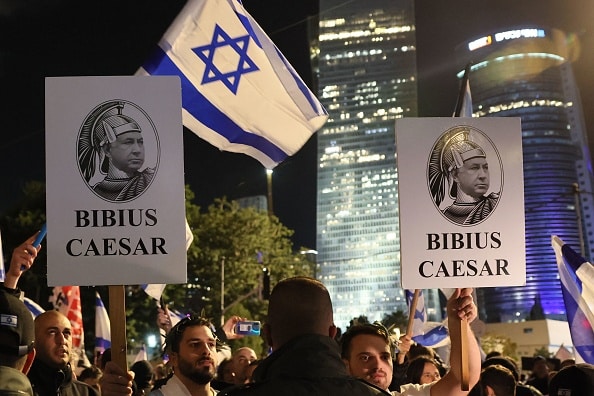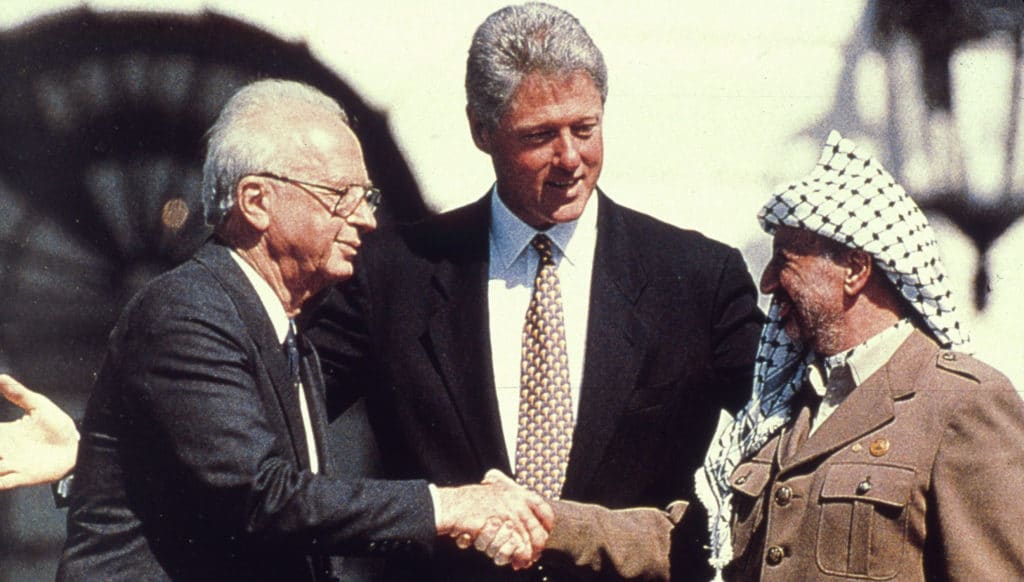
We’re curious…
When does legitimate criticism of a politician or government cross the line into incitement? Recent comments by three Israeli public figures — all of whom had harsh words against Prime Minister Benjamin Netanyahu and his government — have shined a light on that question.
On Friday, Zeev Raz, a former combat pilot who led the 1981 mission to bomb an Iraqi nuclear reactor, wrote on Facebook: “If a sitting prime minister assumes dictatorial powers, this prime minister is bound to die, simply like that, along with his ministers and his followers.”
Raz further argued that the Jewish religious principle of “din rodef,” which allows for the killing of an individual who intends to kill or harm others, could apply to a prime minister in that case. “Din rodef” was notoriously used against Prime Minister Yitzhak Rabin before he was assassinated.
The next day, Raz apologized for his remarks, saying that his “words were misinterpreted” and that he simply intended to “warn against a future dictatorship.”
Raz wasn’t the only one to come under criticism for incitement to violence in the past week. Last Wednesday, David Hodak, another celebrated wartime hero, said he “won’t hesitate to use live fire” if forced to live in a dictatorship. Meanwhile, at an anti-government protest on Saturday, Tel Aviv Mayor Ron Huldai warned that “if words end, the actions will begin.”
The comments came as Israel’s government prepares to overhaul the country’s judicial system. The proposed reforms would weaken the Supreme Court by significantly limiting its power to review laws and strike them down, among other changes.
In a rare statement, the Shin Bet security agency warned of an “increase in violent and inciting discourse against elected officials in general and the prime minister in particular.” The security agency added that people have a right to protest, but that “calls for harm and violence are outside the legitimate discourse.”
At this tense moment in Israeli society, how are Israeli politicians reacting to these comments? Plus, let’s understand this moment in context and take a look back at the hateful rhetoric leading up to Yitzhak Rabin’s assassination.
Diversity of perspectives
Politicians across the political spectrum condemned the remarks. In response to Raz’s comments, Netanyahu said in a statement:
“It seemed that all boundaries had been crossed by threats against elected officials and myself, but this is not the case, because we have now heard and seen an explicit threat to murder the prime minister of Israel.”
“I know that there is a debate over what endangers democracy, but this is not something that is subject to dispute — this truly endangers democracy,” the prime minister added.
“The incitement against Prime Minister Netanyahu breaks records of insanity,” the Likud party declared on Twitter. “The Shin Bet and the police must act immediately to arrest him and the other instigators against the prime minister.”
ההסתה נגד ראש הממשלה נתניהו שוברת שיאים של טירוף. אנחנו מזועזעים מקריאתו של זאב רז לרצוח את ראש הממשלה נתניהו ואת שרי הממשלה. שב״כ והמשטרה חייבים לפעול מייד כדי לעצור אותו ואת יתר המסיתים נגד ראש הממשלה נתניהו. pic.twitter.com/jm91PRAkfi
— הליכוד (@Likud_Party) February 4, 2023
Opposition leader Yair Lapid said he “strongly condemns all incitement and the din rodef call against Netanyahu. This fight [against the judicial overhaul] is for the soul of the country. Any incitement and violence only harms the battle to save the nation.”
מגנה בכל תוקף כל הסתה ואת הקריאה לדין רודף על נתניהו. המאבק הזה הוא על נשמתה של המדינה. כל הסתה ואלימות רק פוגעת במלחמה להצלת המדינה. אני קורא לכל אוהבי המדינה תפגינו, תמחו, צאו לרחובות, אבל שמרו על החוק, אל תובילו לאלימות.
— יאיר לפיד – Yair Lapid (@yairlapid) February 4, 2023
National Unity party chairman Benny Gantz expressed a similar sentiment, tweeting: “It is absolutely forbidden to be dragged to those places, and no one has the license to incite, no matter how much they may have contributed to the country.”
“We will fight… in the streets, in the parliament and by other means — [but] not through incitement and calls for murder,” the former defense minister added.
אני מגנה בתוקף כל קריאה לאלימות או הסתה. אסור בתכלית האיסור להיגרר למחוזות הללו ולאף אדם אין רישיון להסית לא משנה כמה תרם למדינה.
— בני גנץ – Benny Gantz (@gantzbe) February 4, 2023
ניאבק במהפכה המשטרית – ברחובות, בפרלמנט ובאמצעים נוספים – לא בדרך של הסתה וקריאה לרצח.
“There is a difference between freedom of expression and disseminating incitement, and Raz crossed that red line,” the Jerusalem Post Editorial Board wrote.
“It is legitimate to demonstrate, to protest against the government and the prime minister at its head. It is not legitimate — or moral — to call for violence or to create an atmosphere in which someone might get the impression that violence is an acceptable solution,” they added.
How hateful rhetoric led to Rabin’s assassination
Born in Jerusalem in 1922, Yitzhak Rabin first became known for his military achievements. In the 1948 War of Independence, Rabin directed Israeli operations in Jerusalem and fought against the Egyptian forces in the Negev. In the Six-Day War, he helped mastermind the legendary, preemptive strike that crippled Egyptian air bases and led to Israel’s victory.
On June 3, 1974, Rabin made history as Israel’s first prime minister who was born in the land of Israel. During his first term in office, he oversaw Operation Thunderbolt (also known as Operation Entebbe), the miraculous rescue of hostages held in Entebbe airport in Uganda.
During his second term as prime minister, Rabin — who had been involved in so much military conflict — appeared to have a singular mission: peace. Rabin and Israel’s Foreign Minister, Shimon Peres, oversaw the initiation of the Oslo peace process with Palestinian leader Yasser Arafat.
The Oslo process reached a climax in September 1993. With cameras clicking, Rabin shook hands with Arafat on the White House lawn with President Bill Clinton looking on. Some reporters described Rabin’s awkwardness (captured in the photographs) as a reluctant groom about to say “I do.”

While speaking the language of peace in English, Arafat would call for “jihad to liberate Jerusalem” in Arabic. During this time, Palestinian terror attacks, especially suicide bombings, were pervasive, occurring almost daily. From January until August 1995, 40 Israeli civilians were killed by Palestinian suicide bombers.
In widespread protests, Israelis voiced their displeasure with land concessions in a peace deal, citing serious security concerns. In some cases, this included hate-filled rhetoric, even death threats, against Rabin.
Some right-wing Jewish extremists cited the halachic principle of “din rodef” against the prime minister. They said that if someone intends to kill or harm Jews, to prevent it, Jews are obligated to kill the pursuer.
A young Orthodox law student named Yigal Amir believed that this applied to Rabin. In his view, Rabin was negotiating with Arafat, the mastermind behind the murder of Israeli athletes at the 1972 Munich Summer Olympics and countless other terror attacks. He believed that giving more land to Arafat would only lead to more terror, endangering Jewish lives.
On November 4, 1995, Amir went to a gigantic peace rally where Rabin and his supporters of Oslo were gathered. Amir shot Rabin as he was entering his car. Within 40 minutes, standing outside the hospital, Rabin’s bureau chief Eitan Haber announced that the prime minister was dead.
Rabin’s aides had urged him to wear a bulletproof vest, but he refused, saying, “If there comes a time when I would need a bulletproof vest, I no longer want to be prime minister of this country.” Amir was sentenced to life in prison after trying to make the argument in court that the assassination was in accordance with Jewish law.
It was the first political assassination of its kind in Israel. The fact that it was perpetrated by a Jew rocked Israel’s psyche. It also played an important role in derailing the Oslo peace process, which was never fully ratified.
Rabin’s assassination led to deep rifts in Israeli society — between the right and the left as well as between religious and secular Israelis — that persist to this day.
Today, if you were to walk the streets of Israel and ask about Rabin, you would hear a range of perspectives. But similar to John F. Kennedy’s assassination and the 9/11 attacks, every Israeli citizen who was more than a few years old at the time remembers where they were when they heard the news that Rabin had been killed.
Ultimately, the story of the intense, hate-filled rhetoric that led up to Rabin’s assassination shows the power of words. Words can spread love and unity or they can promote division and hatred. It reminds all of us to be careful with our words and use our words for good. In intense moments, precisely when it is most difficult to do so, is when it is the most important to take immediate steps to lower the temperature.
Originally Published Feb 6, 2023 11:32PM EST
